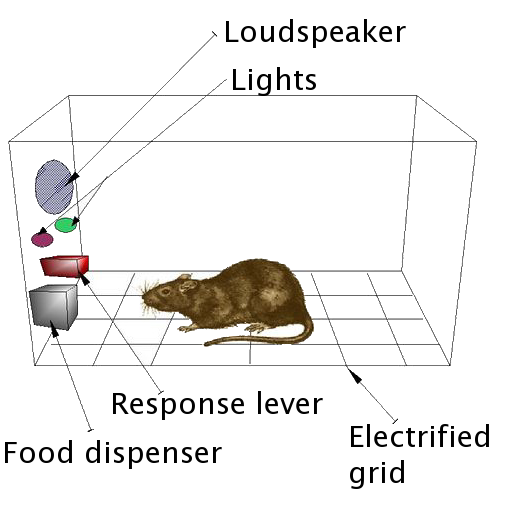
diagram of a Skinner box (credit: Wikimedia Commons)
Problems similar to those in AI and Neurophysiology beset Behavioural Psychology. Researchers
can condition rats, pigeons, or other animals and predict what they will do in controlled experiments, but
many exceptions have to be made when one tries to give behaviorist explanations of what humans do
in everyday life.
In a simple example, alcoholics who say they truly
want to get sober for good can be given a drug that makes them violently,
physically ill if they imbibe even very small amounts of alcohol, but that does
not affect them as long as they do not drink alcohol. This would seem to be a
behaviourist’s solution to alcoholism, one of society’s most intractable
problems. But alas, it doesn’t work. Thousands of alcoholics have kept on with
their self-destructive ways while on disulfiram.13 What is going on
in these cases is obviously much more complex than Behaviourism’s best theories
can account for. And this is but one simple example.
I, for one, am not disappointed to learn that the
human animal turns out to be a very complex, evolving, open-ended piece of
work, no matter the model under which we analyze it.
At present, it appears that empiricism can’t provide a rationale
for itself in theoretical terms and can’t demonstrate the reliability of its
methods in material ways. Could it be another set of interlocking, partly
effective illusions, like Christianity, Communism, or Nazism once
were? Personally, I don’t think so. The number of achievements of Science and
their profound effects on our society argue powerfully that Science
is a way of thinking that gets results in the real world, even though its
theories and models are constantly being updated and even though its way of
thinking can’t logically justify itself.
However, sometimes models of reality from some of
our once most widely believed and trusted scientific theories—for example,
Newton’s laws of motion—have turned out to be inadequate for explaining more
detailed data drawn from more advanced observations of reality. The mid-1800's view of the universe provided by bigger telescopes and better technologies led
astronomers past Newton’s laws and eventually toward Einstein’s theory of relativity.
Newton’s picture of the universe turned out to be naïve though it was useful
on our everyday scale.
Thus, considering how revered Newton’s model of the
cosmos once was, yet knowing now that it gives only a partial and inadequate
picture of the universe, can cause philosophers and even ordinary folk to doubt
the way of thought that is basic to Science. One can’t help but question
whether empiricism is trustworthy enough to be used as a base for something as
desperately important as a moral code for our species. Our survival is at stake
here. Science can’t even provide a model that can explain Science itself.
As we seek to build a moral system we can all try
to live by, we feel driven to look for a way of thinking about thinking and
knowing that is deeper and based on stronger logic, a way of thinking about
thinking that we can believe in profoundly. We need a new model of human thinking,
one built around a core philosophy that is different from empiricism, not just
in degree but in kind.
No comments:
Post a Comment
What are your thoughts now? Comment and I will reply. I promise.